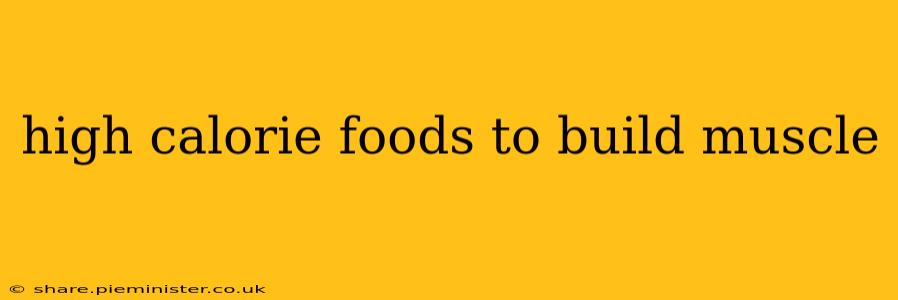Building muscle requires a consistent surplus of calories to support the increased energy demands of training and recovery. Simply put, you need to consume more calories than you burn. This guide explores high-calorie foods that can effectively support your muscle-building goals, focusing on nutrient-dense options to avoid excess unhealthy fats and sugars.
What Makes a Food "High-Calorie"?
Before diving into specific foods, it's important to understand what constitutes a high-calorie food. High-calorie doesn't automatically mean unhealthy. It simply means a food provides a significant number of calories per serving. These calories come from macronutrients: carbohydrates, proteins, and fats. The key is to choose high-calorie foods that are also rich in protein and healthy fats, while keeping added sugars to a minimum.
High-Calorie Foods Rich in Protein
Protein is crucial for muscle growth and repair. Combining protein-rich foods with other high-calorie options helps you hit your daily caloric needs without sacrificing protein intake.
-
Nuts and Seeds: Almonds, cashews, walnuts, chia seeds, and flaxseeds are packed with healthy fats and protein, contributing significantly to your daily calorie intake. A handful of mixed nuts can easily add 200-300 calories.
-
Lean Red Meat: Beef, lamb, and bison are excellent sources of protein and iron, both vital for muscle building. Opt for lean cuts to minimize unhealthy fats.
-
Chicken and Turkey: These are classic muscle-building foods, offering lean protein with relatively lower calories than red meat. Increase the calorie density by incorporating healthy cooking methods, such as roasting with skin on.
-
Fish (Fatty Varieties): Salmon, tuna, and mackerel are high in protein and omega-3 fatty acids, beneficial for both muscle growth and overall health.
-
Eggs: A versatile and affordable source of protein and essential nutrients. Consider adding whole eggs for increased calorie density.
High-Calorie Foods Rich in Healthy Fats
Healthy fats are essential for hormone production, cell function, and overall well-being. Incorporating these into your diet will not only increase your calorie intake but also support optimal muscle growth.
-
Avocados: Rich in monounsaturated fats, fiber, and nutrients. They're a delicious and healthy way to boost your calorie intake.
-
Olive Oil: Use olive oil for cooking or as a salad dressing to increase your calorie intake with healthy fats.
-
Nut Butters: Peanut butter, almond butter, and cashew butter are high in calories and protein, making them perfect for adding to smoothies, oatmeal, or enjoying straight from the jar (in moderation!).
-
Dairy Products (Full-Fat): Full-fat Greek yogurt, whole milk, and cheese provide calories, protein, and calcium, contributing to a balanced muscle-building diet.
High-Calorie Carbohydrate Sources
Carbohydrates provide energy for your workouts and help replenish glycogen stores. However, focus on complex carbohydrates, which are digested more slowly than simple carbohydrates, providing sustained energy without leading to rapid blood sugar spikes.
-
Brown Rice: A good source of complex carbohydrates and fiber.
-
Sweet Potatoes: Provide complex carbohydrates, fiber, and vitamins.
-
Oats: A hearty and versatile option that can be incorporated into many meals and snacks.
-
Quinoa: A complete protein source with high carbohydrate content.
High-Calorie Smoothies for Muscle Gain
Smoothies provide a convenient way to pack in extra calories and nutrients. You can combine protein powder, fruits, nut butters, and milk or yogurt to create a muscle-building powerhouse.
How Many Calories Do I Need?
The ideal calorie intake varies greatly depending on your age, gender, activity level, body composition, and individual metabolism. Consulting a registered dietitian or certified personal trainer can help you determine your specific caloric needs for muscle growth. They can create a personalized meal plan that aligns with your fitness goals and ensures you're consuming the right balance of macronutrients.
What are some high calorie vegan options for muscle building?
Many vegan options can support muscle growth and contribute to a high-calorie diet. Consider incorporating tofu, tempeh, edamame, lentils, and various nuts and seeds. Vegan protein powders can also help supplement your protein intake. Remember to focus on variety and healthy fats from sources like avocados and olive oil to achieve the necessary calorie surplus.
Are there any potential downsides to consuming high-calorie foods?
While consuming high-calorie foods is necessary for muscle growth, it's crucial to make healthy choices. Consuming excessive amounts of unhealthy fats and added sugars can lead to weight gain in the form of fat, rather than muscle, and can negatively impact overall health. Focus on nutrient-dense, whole foods and consult a professional for personalized guidance.
Can I gain muscle without eating high-calorie foods?
It's significantly more challenging to gain muscle without a calorie surplus. While you might see some gains, your progress will likely be slower and less efficient. A calorie surplus is generally necessary to support the energy demands of muscle growth.
By incorporating these high-calorie, nutrient-rich foods into your diet, you can effectively fuel your muscle growth and reach your fitness goals. Remember that consistency is key, and a balanced approach to nutrition, combined with a well-structured training program, will yield the best results. Always consult with a healthcare professional before making significant dietary changes.
